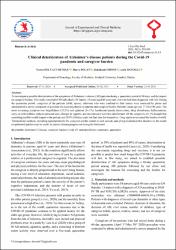Clinical deterioration of Alzheimer's disease patients during the Covid-19 pandemic and caregiver burden
Künye
Helvacı Yılmaz, N., Polat, B., Ermiş, A. ve Hanoǧlu, L. (2021). Clinical deterioration of Alzheimer's disease patients during the Covid-19 pandemic and caregiver burden. Journal of Experimental and Clinical Medicine (Turkey), 38(3), 255-259. https://dx.doi.org/10.52142/omujecm.38.3.9Özet
To investigate a possible deterioration of the symptoms of Alzheimer's disease (AD) patients during a quarantine period of 60 days, and the impact on caregiver burden. This study consisted of 54 individuals (36 female, 18 male) aged 60 years and over who had been diagnosed with AD. During the quarantine period, caregivers of the patients (child, spouse, relatives) who were confined to their homes were contacted by phone and administered a survey composed of questions for neuropsychiatric symptoms and caregiver burden. Patients' mean age was 77.18±6.96 years. The most worsening symptom was forgetfulness (35.2%) and agitation (24.1%). Incoherent speech, introversion, sleep disturbance, hallucinations, carry on with hobbies, reduced personal care, changes in appetite, and incontinence were less deteriorated. Of the caregivers, 61.1% thought that something terrible would happen to the patient, and 38.9% felt they could not find time for themselves. Drug rejection increased the burden twofold. Telemedicine methods, providing opportunities for the caregiver and the patient to walk outside, and giving medication that dissolves in the mouth or epidermal patches may be useful to prevent disease progression during the lockdown.
Scopus Q Kategorisi
Q4Kaynak
Journal of Experimental and Clinical Medicine (Turkey)Cilt
38Sayı
3Koleksiyonlar
- Makale Koleksiyonu [3777]
- Scopus İndeksli Yayınlar Koleksiyonu [6574]


















